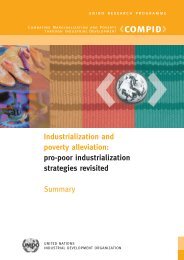(EGM) Foreign Direct Investment in Southeast Asia - Unido
(EGM) Foreign Direct Investment in Southeast Asia - Unido
(EGM) Foreign Direct Investment in Southeast Asia - Unido
You also want an ePaper? Increase the reach of your titles
YUMPU automatically turns print PDFs into web optimized ePapers that Google loves.
Fourthly, <strong>in</strong> terms of a framework for IP, there is a press<strong>in</strong>g need for develop<strong>in</strong>g<br />
countries to improve the sophistication of IP strategy and organisation [UNIDO (2003a)] and<br />
move towards a fourth generation of <strong>in</strong>vestment promotion policies, measures and techniques.<br />
3. THEMATIC CHALLENGES FOR FDI POLICY CRAFT<br />
Serious challenges and questions are posed by the five themes of the <strong>EGM</strong>. It is<br />
<strong>in</strong>structive to note that MNEs production networks and regional dimensions of FDI are major<br />
issues for the macro-economy and are very much to the fore 40 . The themes that encapsulate the<br />
major areas of concern for policies to attract and reta<strong>in</strong> FDI can be categorised as follows:<br />
• FDI and MNEs <strong>in</strong> <strong>Southeast</strong> <strong>Asia</strong>: Globalisation’s Challenges.<br />
• Intra-regional FDI and Regional Trade and <strong>Investment</strong>.<br />
• Boundaries, Hierarchies, Markets and FDI.<br />
• The Ch<strong>in</strong>a Dimension to FDI <strong>in</strong> <strong>Southeast</strong> <strong>Asia</strong><br />
• Capital Markets and FDI <strong>in</strong> <strong>Southeast</strong> <strong>Asia</strong><br />
These themes reflect the weight and importance of FDI to <strong>in</strong>dustrial development. They present<br />
host country policy makers with an unenviable task of ‘aim<strong>in</strong>g at’ the fast mov<strong>in</strong>g target (with rapidly<br />
chang<strong>in</strong>g shape) of MNEs.<br />
Without anticipat<strong>in</strong>g the content of thematic presentations and plenary discussions on<br />
the emergent issues identified, this paper -- act<strong>in</strong>g as a lens -- should enable a sharper focus on<br />
key aspects of the co-evolv<strong>in</strong>g structure, behaviour and environment of MNEs and FDI <strong>in</strong> order<br />
to tease out key questions for host country policy makers.<br />
3.1. FDI and MNEs <strong>in</strong> <strong>Southeast</strong> <strong>Asia</strong>: Globalisation’s Challenges<br />
The long view of the political-economy of cross-border transactions <strong>in</strong> FDI with<strong>in</strong> the ‘new<br />
economy’ and its impact has resulted <strong>in</strong> crucial changes <strong>in</strong> strategic th<strong>in</strong>k<strong>in</strong>g with<strong>in</strong> MNEs and MNEs<br />
decision-mak<strong>in</strong>g. This carries serious consequences for FDI policy craft <strong>in</strong> develop<strong>in</strong>g countries [Buckley<br />
and Ghauri (2004); Buckley (2003); Caplen (2001)].<br />
MNEs with predictably structured divisions locked <strong>in</strong>to rigid l<strong>in</strong>kages with other parts of<br />
the same firm have evolved <strong>in</strong>to a new <strong>in</strong>ternational structure <strong>in</strong> an environment that is very<br />
different from earlier times. This is very challeng<strong>in</strong>g from a policy perspective. With<br />
competitive pressures <strong>in</strong>creas<strong>in</strong>g relentlessly, the questions asked by MNEs are first, where to<br />
locate productive assets and manufactur<strong>in</strong>g activity <strong>in</strong> a manner that efficiently differentiates<br />
40 See Tokyo Club Foundation for Global Studies, Major Issues for The World Economy to 2005, Macro<br />
Economy Research Conference, 8-9 November 2004, Tokyo, Japan for the range of issues which concentrated<br />
on regionalisation and MNEs strategies.<br />
79

















